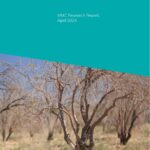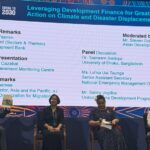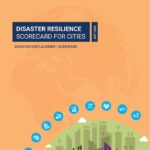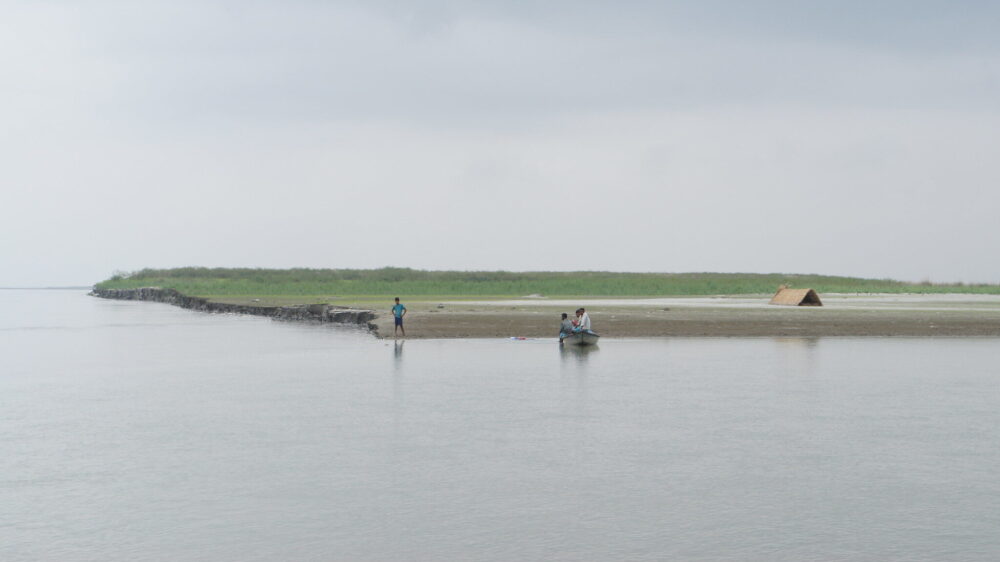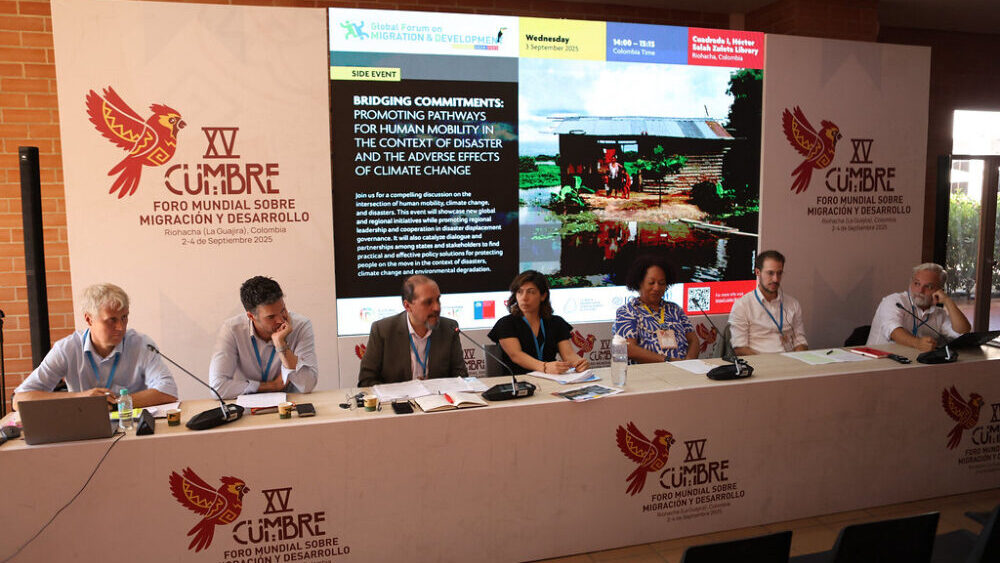Disaster Displacement Prominent on the Agenda at Asia Pacific Ministerial Conference on Disaster Risk Reduction 2024
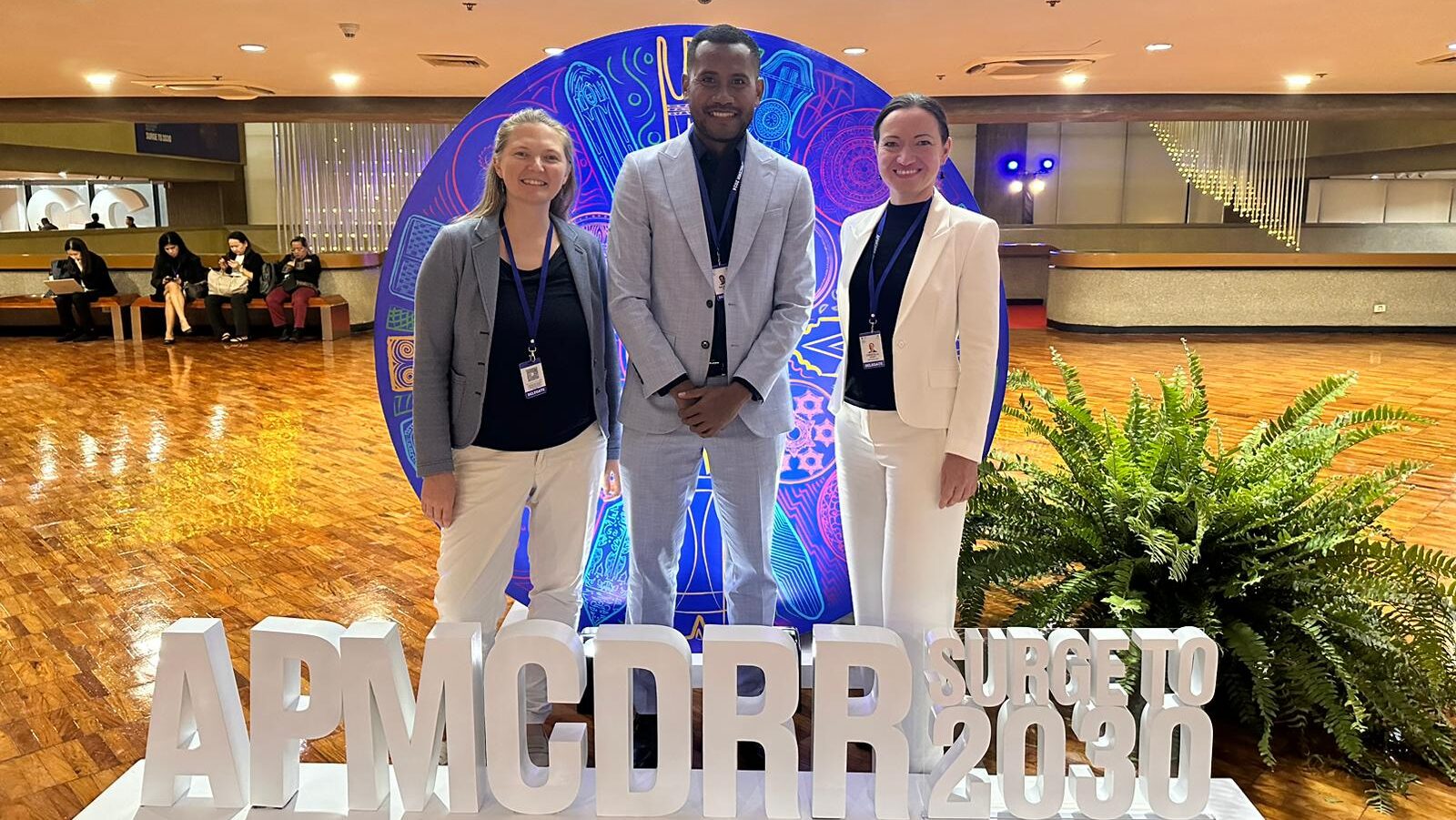
Manila, Philippines – The Second Asia Pacific Ministerial Conference on Disaster Risk Reduction 2024 (APMCDRR) took place from 14 to 18 October 2024 and was jointly organized by the Government of the Philippines and the United Nations Office for Disaster Risk Reduction (UNDRR). The APMCDRR is the main platform in the Asia Pacific region to advocate for the implementation of the Sendai Framework for Disaster Risk Reduction 2015-2030.
The conference was held in Manila, Philippines under the working theme “Surge to 2030: Enhancing ambition in Asia-Pacific to accelerate disaster risk reduction”. Over 5,000 in-person delegates and representatives and over 7,000 online delegates attended the Conference.
Disaster displacement was very prominently discussed at the conference: there were several events and other formats organized by the PDD and its partners. In line with the Philippines’ championship on this topic as a member of the PDD Steering Group, disaster displacement was mentioned during the opening ceremony by the President of the Philippines, H.E. Ferdinand R. Marcos Jr., and it was included in the outcome document.
The Co-Chairs’ Statement stipulates, in paragraph 21:
More efforts are required on preventative measures and durable solutions for disaster displacement. Displacement continues to be on the rise disrupting lives and livelihoods. It is necessary to reinforce the focus on finding durable solutions and investments to address disaster related displacement and planned relocation, including preventive measures built on a sound understanding of systemic risk with the full engagement of communities and concerned persons.
In in his opening speech for APMCDRR, the the President of the Philippines said:
We must acknowledge that climate change and disasters are catalysts for human displacement.
This necessitates forward-thinking policies that create safe pathways for migration and to support those displaced by disasters so that they can rebuild their lives with dignity and security.
On our side, we remain steadfast in empowering our local authorities and working closely with our youth to implement nature-based and ecosystem-centered solutions that not only address their unique challenges, but also honor their local traditions and practices,” he added.
The government of the Maldives, also a PDD Steering Group member, were also present at APMCDRR and in their national statement said:
The Maldives is currently navigating significant challenges posed by climate change and rising sea levels. In the years ahead, this situation may lead to the potential displacement of island communities due to climate-related factors. In response, the Maldivian government is actively pursuing robust measures to safeguard our islands and explore the reclamation of higher, more resilient land.
Partner Event: Leveraging Development Finance for Greater Action on Climate and Disaster Displacement
The Asian Development Bank (ADB), Internal Displacement Monitoring Centre (IDMC), and the Asia-Pacific Disaster Displacement Working Group organized a partner event entitled “Leveraging Development Finance for Greater Action on Climate and Disaster Displacement” on 15 October 2024 at APMCDRR.
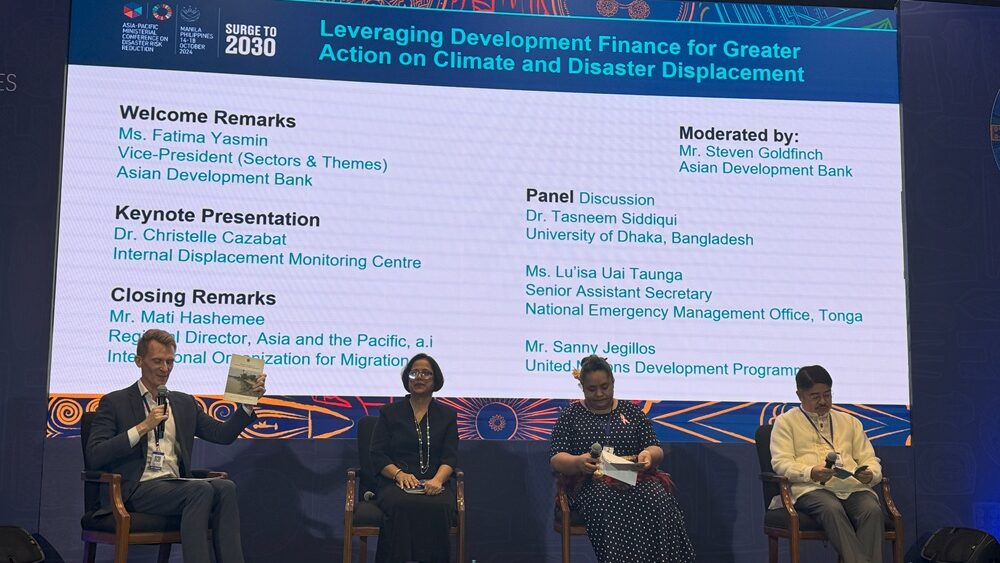
Ms. Fatima Yasmin, Vice-President for Sectors and Themes of ADB gave welcome remarks. The keynote address was presented by Dr. Christelle Cazabat from the Internal Displacement Monitoring Centre. Mr. Steven Goldfinch, Senior Disaster Risk Management Specialist at ADB moderated the event. The panelists included Dr. Tasneem Siddiqui from University of Dhaka, Bangladesh, Mr. Lu’isa Uai Taunga, Senior Assistant Secretary at National Emergency Management Office in Tonga, and Mr. Sanny Jegillos from the United Nations Development Programme (UNDP). The closing remarks were provided by Mr. Mati Hashemee, Regional Director Asia and the Pacific (ad interim) of the International Organization for Migration.
To learn more about this event, read our longer reporting back article.
Learning Lab- The Importance of Home: Preparing Houses and Communities for Disaster and Displacement
Build Change presented its tool BCTap which can be used by stakeholders at the local level to build disaster resilient housing. Ms. Sarah Koeltzow of the PDD together with partners from IDMC, IOM, and UNDRR presented the Disaster Displacement Addendum to the Disaster Resilient Cities Scorecard.
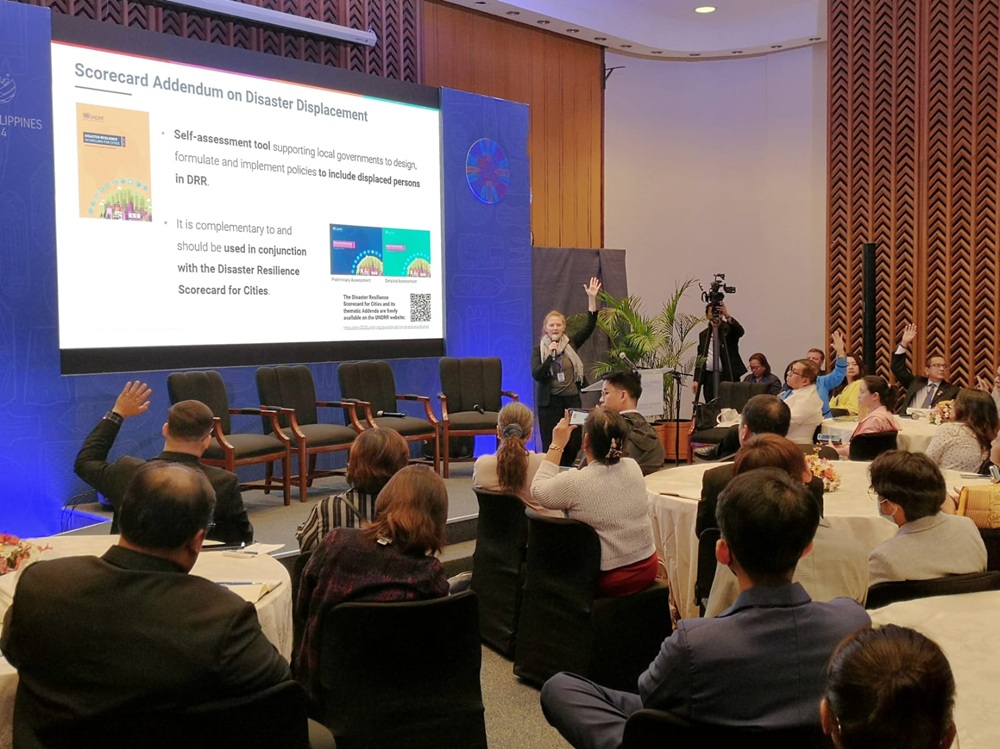
The Disaster Displacement Addendum is a self-assessment tool that can support local governments to design, formulate and implement policies to include displaced persons in disaster risk reduction. It was developed by a large group of stakeholders from 2022 – 2024 and piloted in Brazil, Trinidad and Tobago, Kenya and Iraq. This was the first time the Addendum was presented in the Asia Pacific region. The Learning Lab attracted a full room of interested practitioners and policy makers, especially local level government representatives from the Philippines but also from Australia, India and the Maldives who presented their questions, shared their experiences and expressed interest in the tool.
Other Relevant Sessions
On 15 October 2024, at the Philippines pavilion, IOM and the Philippines organized a session titled “Reducing Disaster Risk and Building Resilience: Tools to Address Displacement and Human Mobility in the Era of Climate Change”. Speakers included Hon. Bernardo Rafaelito Alejandro IV, Assistant Secretary and Deputy Administrator of the National Disaster Risk Reduction and Management Council, Government of the Philippines, Hon. Sakiasi Ditoka, Minister, Ministry of Rural and Maritime Development and Disaster Management, Government of Fiji, Mr. Ganbold Gonchig, Advisor to the Deputy Prime Minister, Government of Mongolia, Mr. Mati Hashemee, Regional Director a.i, IOM Regional Office for Asia and the Pacific, Mr. Nacanieli Speigth, Regional Advisor- Disaster Displacement, Pacific, PDD and IDMC, and Mr. George May, Migrant Protection and Development Specialist, United Nations Development Programme.
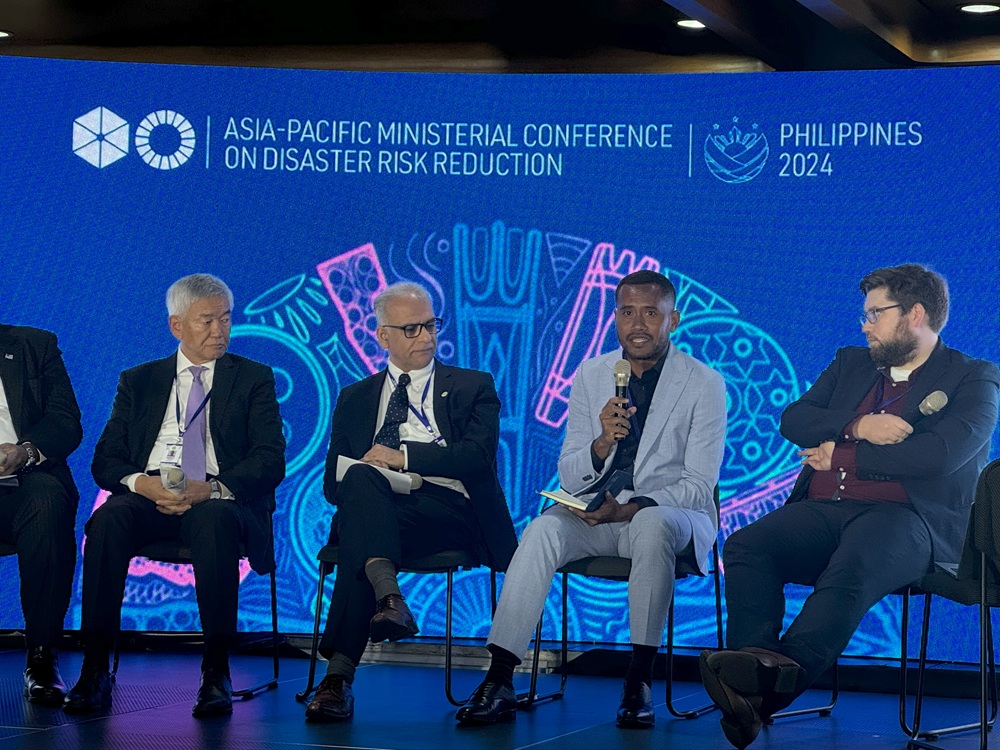
Mr. Nacanieli Speigth, in his intervention, noted that APMCDRR 2024 marks a huge progress in seeing the coming of the world’s two most disaster-prone regions.
“There is so much traditional knowledge that is being lost in displacement. Yet the intangible is what makes us resilient people in the Pacific,”
Mr. Speigth emphasized while reflecting on senior government officials’ statements and recalling the outcome of the Pacific Ministerial to include traditional knowledge in DRR data. He underscored the need to go beyond the tangible losses when looking at the cost of disaster displacement. The need to therefore empower and build the capacity of local government who are closer to the people is more pivotal than ever.
On 16 October 2024, IOM gave an Ignite Stage talk jointly with the University of the Philippines Resilience Institute, that focused on ‘Operational Foresight for Local Action in the Context of Climate Displacement’ Mr. Brad Mellicker presented IOM’s work on a Risk Index for Climate Displacement through a Co-Creation Hub (CCH) and its linkages with a Climate Catalytic Fund (CCF) that would support local action to prevent displacement, support resilience, and enhance preparedness.
UNHCR also gave an Ignite Stage talk in which Mr. Sean Keogh presented some main findings from the recently finalized UNDRR-UNHCR led study on mapping human mobility in national and regional disaster risk reduction strategies and related instruments that has been supported by the PDD and other partners.

